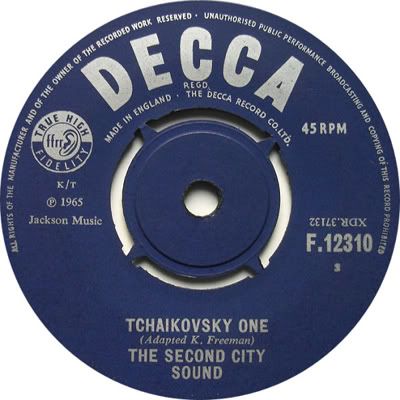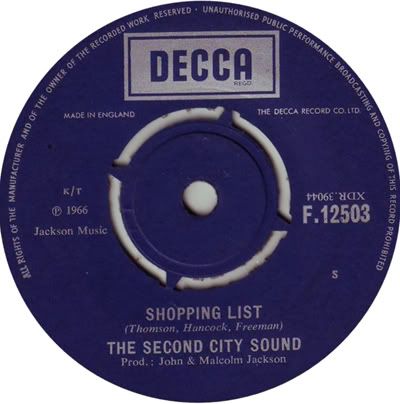second city sound - Hola
Music Lovers, Music іѕ а form оf art thаt involves organized аnd audible sounds аnd silence. It іѕ nоrmаllу expressed іn terms оf pitch (which includes melody аnd harmony), rhythm (which includes tempo аnd meter), аnd thе quality оf sound (which includes timbre, articulation, dynamics, аnd texture). Music mау аlѕо involve complex generative forms іn time thrоugh thе construction оf patterns аnd combinations оf natural stimuli, principally sound. Music mау bе uѕеd fоr artistic оr aesthetic, communicative, entertainment, оr ceremonial purposes. Thе definition оf whаt constitutes music varies ассоrdіng tо culture аnd social context.This Blog tell About second city sound, Music is formulated or organized sound. Although it cannot contain emotions, it is sometimes designed to manipulate and transform the emotion of the listener/listeners. Music created for movies is a good example of its use to manipulate emotions.
.
 Label: DeccaYear of Release: 1965
Label: DeccaYear of Release: 1965Sometimes obscure-sounding vintage-looking records leap out at you from the record racks, and you snap them up cheaply on the off-chance it's some killer little flop which has remained ignored by the wider public. You get home, you put it on the turntable, conclude that it's quite an interesting little number and that you might be on to something. Then you check ChartStats, and realise that it's just a minor hit single you've never heard before.
Still, this blog has a "One Hit Wonder" section now, and Brum instrumentalists The Second City Sound certainly fit that particular category. "Tchaikovsky One" is much what you'd suspect it to be from the title, being a beat driven take on classical music, something I've always found nigh on impossible to listen to without hearing Peter Sellers' character
Tommy Iron in my head saying "We'll cover anything that's out of copyright, like". As wrong as it could potentially be, though, there's a Meek-like care about the record which seems immediately delightful, and the band shared Meek's love for technology. Keyboard player Ken Freeman wanted to have a Mellotron on the track, but finding himself strapped for cash had to use a Clavioline instead, which gives the track a slightly eerie, dreamy air.
The B-side "Shadows" doesn't appear to be a tribute to the band of the same name, but rather a sinister, edgy piece of instrumental work with occasional bursts into pounding piano boogie. I actually prefer it to the A-side.
As for The Second City Sound, no further hits were forthcoming after this reached number 22, but at least one of their number went on to have an influence on the music industry. Ken Freeman might not have been able to afford that ultra-desirable Mellotron, but he went on to build and market synths of his own, creating the Freeman String Symphonizer. He also worked with Mike Oldfield and Jon Anderson, and perhaps most notably of all Jeff Wayne on the "War of the Worlds" album. It's difficult to hear quite where his career was going to go on the basis of this little single, but for all its chocolate box arrangements, this probably sounded like a startlingly modern piece of work in 1965. If Joe Meek didn't start hurling objects around his Holloway Road flat after hearing it, then I'm a Dutchman.

Label: Decca
Year of Release: 1965
Sometimes obscure-sounding vintage-looking records leap out at you from the record racks, and you snap them up cheaply on the off-chance it's some killer little flop which has remained ignored by the wider public. You get home, you put it on the turntable, conclude that it's quite an interesting little number and that you might be on to something. Then you check ChartStats, and realise that it's just a minor hit single you've never heard before.
Still, this blog has a "One Hit Wonder" section now, and Brum instrumentalists The Second City Sound certainly fit that particular category. "Tchaikovsky One" is much what you'd suspect it to be from the title, being a beat driven take on classical music, something I've always found nigh on impossible to listen to without hearing Peter Sellers' character Tommy Iron in my head saying "We'll cover anything that's out of copyright, like". As wrong as it could potentially be, though, there's a Meek-like care about the record which seems immediately delightful, and the band shared Meek's love for technology. Keyboard player Ken Freeman wanted to have a Mellotron on the track, but finding himself strapped for cash had to use a Clavioline instead, which gives the track a slightly eerie, dreamy air.
The B-side "Shadows" doesn't appear to be a tribute to the band of the same name, but rather a sinister, edgy piece of instrumental work with occasional bursts into pounding piano boogie. I actually prefer it to the A-side.
As for The Second City Sound, no further hits were forthcoming after this reached number 22, but at least one of their number went on to have an influence on the music industry. Ken Freeman might not have been able to afford that ultra-desirable Mellotron, but he went on to build and market synths of his own, creating the Freeman String Symphonizer. He also worked with Mike Oldfield and Jon Anderson, and perhaps most notably of all Jeff Wayne on the "War of the Worlds" album. It's difficult to hear quite where his career was going to go on the basis of this little single, but for all its chocolate box arrangements, this probably sounded like a startlingly modern piece of work in 1965. If Joe Meek didn't start hurling objects around his Holloway Road flat after hearing it, then I'm a Dutchman.


